
Success Mindsets is the most comprehensive, helpful, and research-based source of mindset knowledge to date. It enhances one’s self-awareness and empowers them to unlock their potential for greater levels of success across their life, work, and leadership.
Exclusive bonus: Get the audiobook and e-book for free with your purchase!
Even though we may not realize it, our mindsets are foundational to everything we do. If we can improve our mindsets, we can improve our success across our life, work, and leadership. In this book, Ryan Gottfredson has compiled the most comprehensive and research-backed book on mindsets to date, all designed to help you develop the following mindsets so you can unlock greater success:


Ali
The book will help change the trajectory of your life if you choose to apply it to your life. It opened my eyes to some blind spots and gave me the tools I need to overcome them. Must read!!!
Lisa
I first heard of Ryan Gottfredson when I was reading an article in a training magazine about leadership and mindsets. I immediately went to his website and took the mindset assessment that he created. I was really impressed with the custom report that I received that detailed how my responses measured up against others who had completed the assessment. If you plan to read this book, you should take the assessment first so that you can reflect as you read on the areas where you have the biggest opportunity to grow. What I learned is that the way I think today, impacts the decisions that I make and the way that I interact with other people both personally and professionally. What resonated the most with me is that it isn’t my personality or what I have or don’t have that prevents me from getting where I want to go: it’s how I perceive challenges, failures, and success. This is a great read with some engaging storytelling, and Gottfredson also shares some of his own humbling experiences that inspired him to build this powerful framework.
Jennifer Stinson
I want to buy a copy of this book for everyone in my office, not because I think they all have negative mindsets but because I believe this book empowers people to learn more about themselves and others.
Awaken to the quality of your mindsets and learn the latest in psychological and neurological research on how you can best upgrade your mindsets.
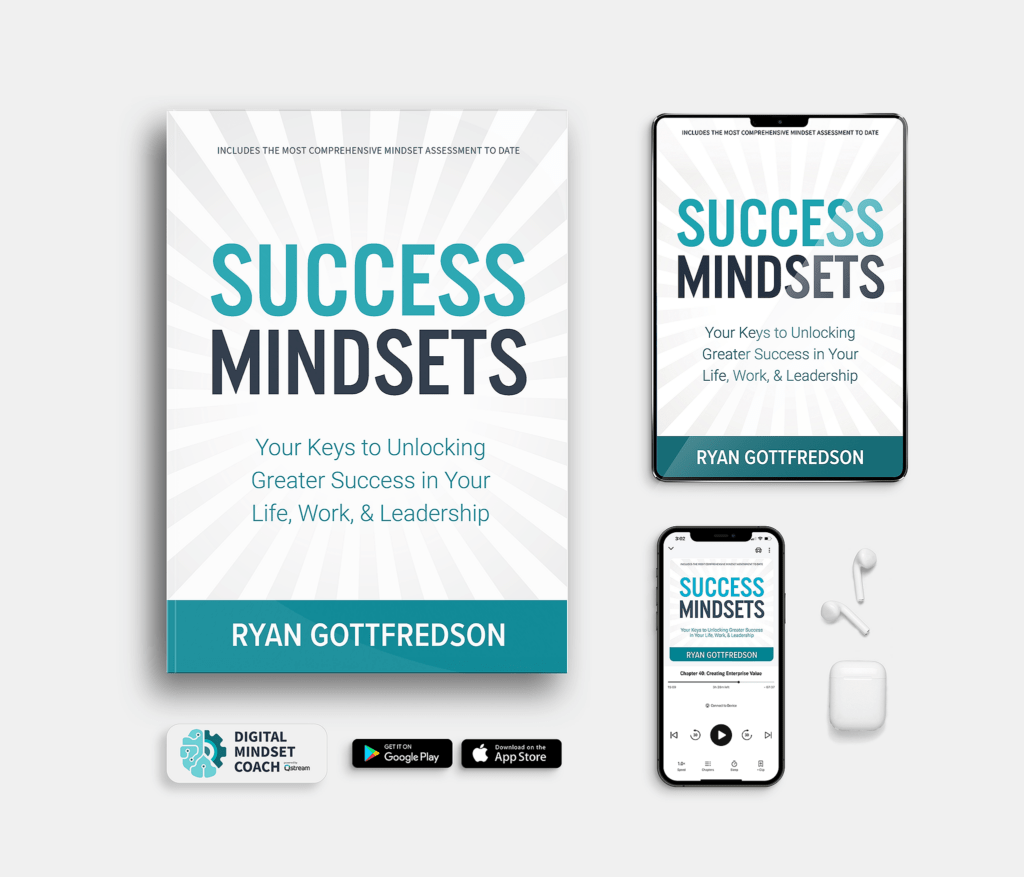
While there are many different mindsets that are “out there,” there are four sets of mindsets that have 30+ years of research backing, indicating that they foundationally shape how we think, learn, and behave.
Each set contains a negative mindset and a positive mindset, each representing a pole along a continuum:
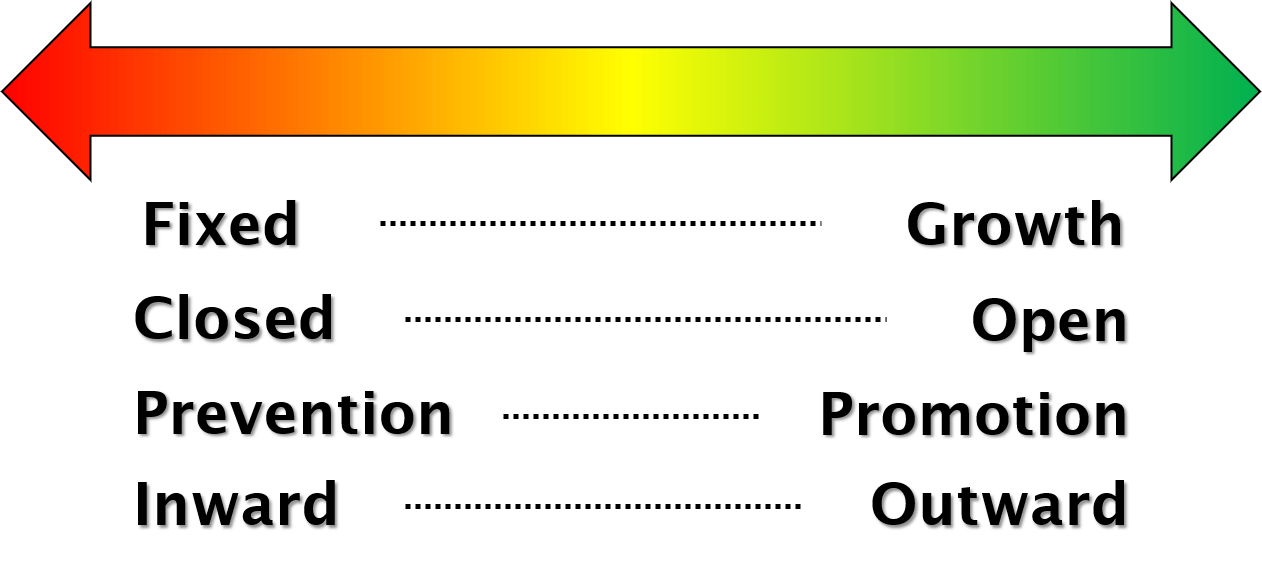
In what follows, I will describe each of these sets of mindsets and demonstrate that they cause us to process and operate differently, largely because they cause us to take on certain fears and commitments that are either self-protecting (negative mindsets) or empowering (positive mindsets).
If you want to take a mindset assessment to identify the current quality of your mindsets, click here: Personal Mindset Assessment.

Definitions:
Fixed mindsets involve the belief that one’s traits are “fixed” and that innate talent alone fosters success. Stated differently, if you have a fixed mindset, you see yourself as being unable to significantly change your talents, abilities, and intelligence. You tend to see the world in terms of “haves” and “have nots;” and you believe that if you are a “have not” in something, you are unable to become a “have.”
Growth mindsets involve the belief that one’s talents, skills, and abilities can grow over time. Stated differently, if you have a growth mindset, you believe you are able to change your talents, abilities, and intelligence. You do not see the world in terms of “haves” and “have nots.” If you happen to see yourself as a “have not” in something at one point in time, you do not believe that is an indication that you can’t become a “have.”
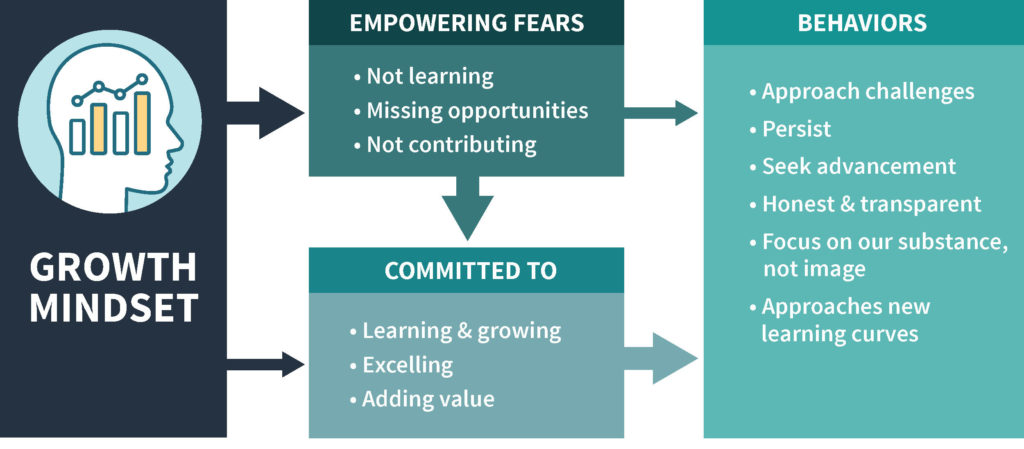
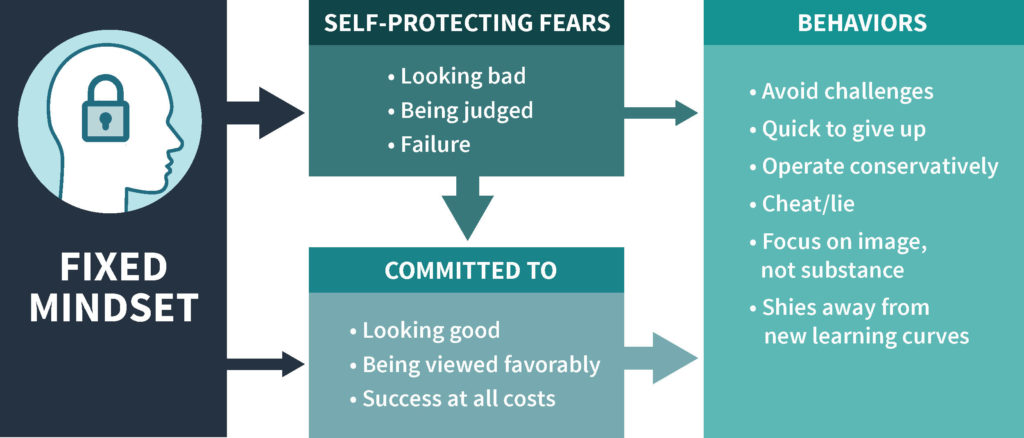
These mindsets cause us to have different priorities (fears and commitments); and consequently, different ways of operating (behaviors).
When we have a fixed mindset, we are afraid to fail, because to us, failure is an indication that we are a failure. Thus, we develop fears around looking bad, making us committed to always looking good. These fears and commitments go on to drive self-protecting behaviors (outlined below) that preserve our image, but are generally detrimental to our long-term growth and success.
When we have a growth mindset, we are not concerned about protecting ourselves from failure. Instead, we are focused on learning, growing, and contributing, and are willing to embrace failure as opportunities to improve and advance. As a result, we are more inclined to operate in a manner more conducive with long-term growth and success.
More than 30 years of research repeatedly demonstrating these effects has left mindset experts to state:
“Cultivating a growth mindset could be the single most important thing you ever do to help you achieve success.”
Click here to dive into the research backing behind these ideas: Research-Backed Benefits of Possessing a Growth Mindset.
The second set of mindsets are closed and open mindsets, with closed mindsets being more negative and open mindsets being more positive.
Definitions:
Because this set of mindsets is often confused with fixed and growth mindsets, let me make a quick distinction: Fixed/Growth mindsets relate to the degree to which we believe we (and others) can grow and develop, while Closed/Open mindsets relate to the degree to which our minds are open to new ideas and suggestions.
Before you look at your results, consider this question: Do you think that you are open-minded?
Well, before you smugly slap an open-minded sticker on your forehead, this quote might ground you: “Close-minded people would never consider that they could actually be closed-minded. In fact, their perceived open-mindedness is what’s so dangerous.”
This bias toward our open-mindedness plays out in the data. So, when you look at your results, it is important to keep in mind that while you may have a decently high score along the 1-7 scale, it is better to notice where you are relative to the thousands of others who have completed the assessment. Further, research has found that demonstrating a closed mindset, even infrequently, paints one as being “closed-minded” in the eyes of others.
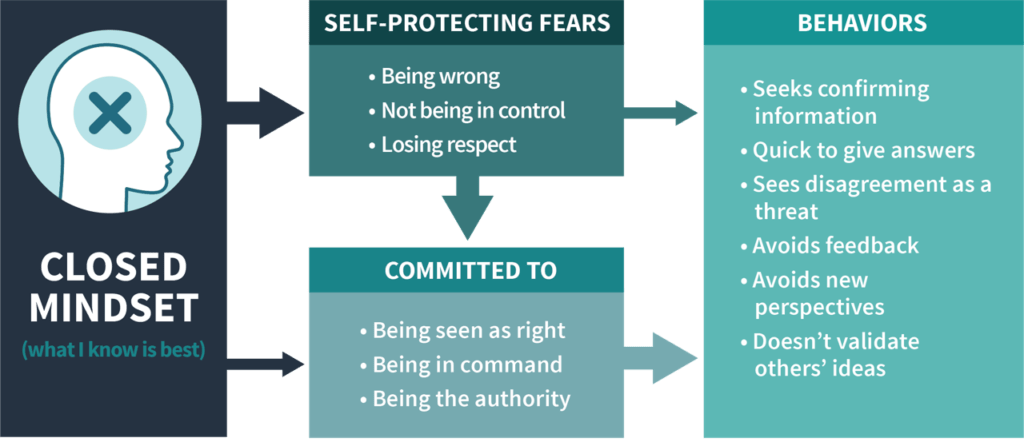
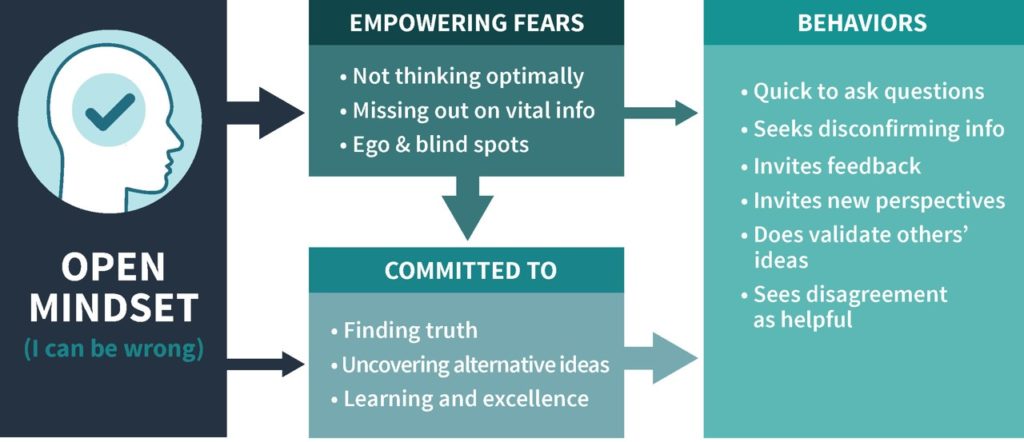
Why would someone be closed-minded? Fundamentally, it is because they believe that what they know is best. When we believe what we know is best, we are fearful of being wrong and want to be seen as right and as the authority. These fears and commitments go on to drive biased thinking, stunt learning, and stifle others.
But, if we can leave room for the idea that we can be wrong, we are not concerned about being right. Instead, we are concerned about finding truth and thinking optimally, resulting in an open mindset. These more healthy fears and commitments go on to drive effective thinking, enhanced learning, and psychological safety (which Google found to be the most important factor in their top-performing teams).
Click here to dive into the research backing behind these ideas: Research-Backed Benefits of Possessing an Open Mindset.
The third set of mindsets are prevention and promotion mindsets, with prevention mindsets being more negative and promotion mindsets being more positive.
Definitions:
When someone has a prevention mindset, they are primarily focused on not losing or avoiding losses. For example, a ship captain with a prevention mindset is going to be primarily focused on not sinking.
When someone has a promotion mindset, they are primarily focused on winning and gains. A ship captain with a promotion mindset, of course, doesn’t want to sink. But, that isn’t the captain’s number one priority. A promotion-minded ship captain’s number one priority is on making progress toward a destination.
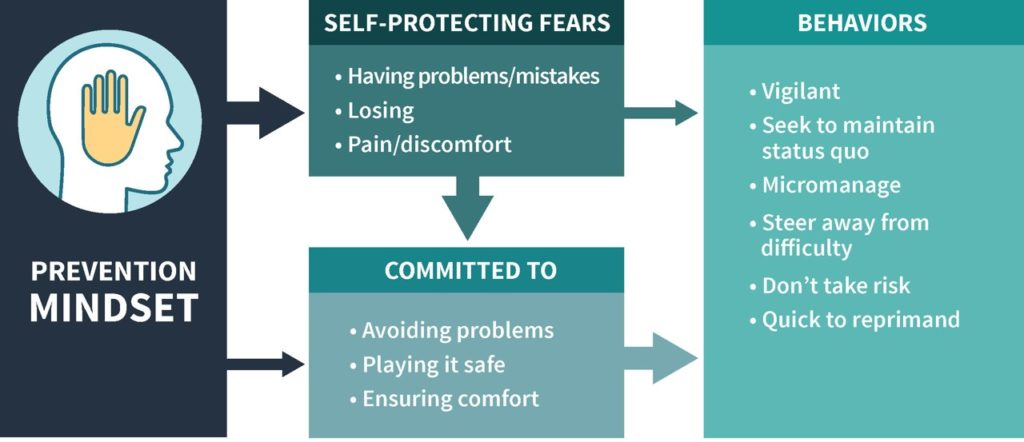
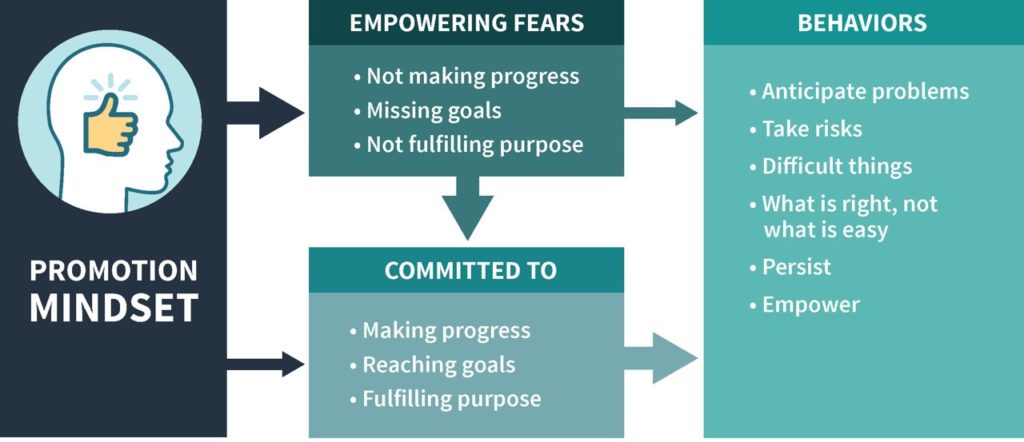
With a prevention mindset, individuals’ primary fears revolve around having problems, making mistakes, losing, or experiencing discomfort (i.e. sinking). As a result, they are committed to avoid problems and play it safe in order to ensure their comfort (i.e., staying afloat). Because of these fears and commitments, they operate in a vigilant manner, actively seeking to avoid problems and difficulties, often by maintaining the status quo, micromanaging, and being quick to reprimand.
On the surface, this seems justifiable, because who likes problems? But, if we are primarily focused on avoiding problems, we end up being focused on running away from difficulty, when the reality is that success requires working through difficulty.
With a promotion mindset, individuals primarily fear not making progress, reaching goals, or fulfilling their purpose. Thus, they are committed to the opposite: making progress, reaching goals, or fulfilling their purpose. Thus, rather than actively seeking to avoid problems and difficulties, they anticipate them, prepare for them, and become willing to take risks and do the difficult things to reach their destination.
A prevention mindset tends to be more comfort-focused, whereas a promotion mindset tends to be more purpose-focused.
Click here to dive into the research backing behind these ideas: Research-Backed Benefits of Possessing a Promotion Mindset.
The fourth set of mindsets are inward and outward mindsets, with inward mindsets being more negative and outward mindsets being more positive.
Definitions:
Recall a time when you:
In these instances, you had more of an inward mindset. When we possess an inward mindset, we see ourselves as being more important than others. This makes us inclined to see others as objects.
When we possess an outward mindset, we see others as being just as important as ourselves. This makes us more inclined to see others as people and value them as such.
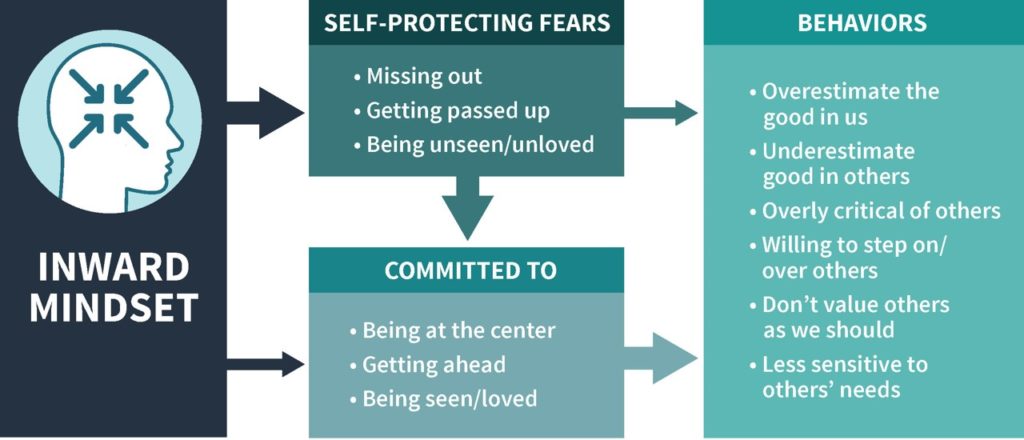
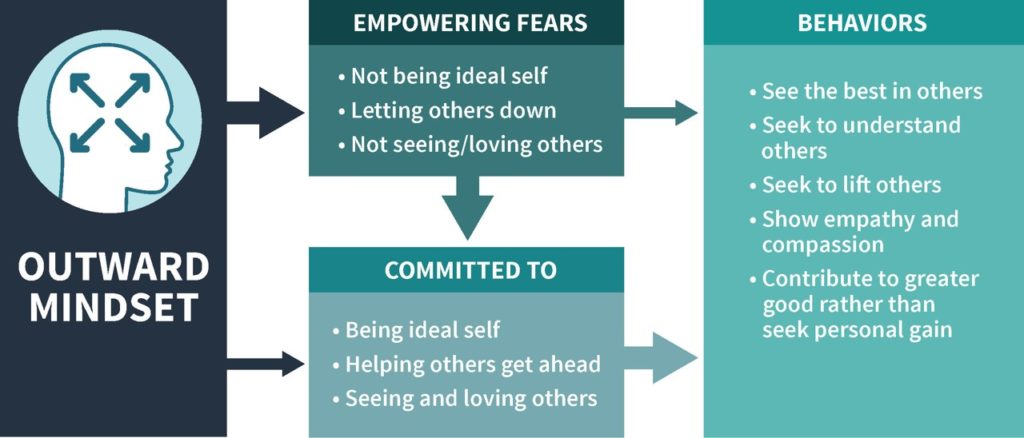
When we have an inward mindset, we are being fueled by self-protecting fears of not missing out, getting passed up, and being unseen or unloved. When we possess these deep-seated fears, we become committed to being at the center of attention, getting ahead, and being seen and loved. While these are justifiable fears and commitments, they generally cause us to operate in a manner that may seem beneficial to us in the moment, but actually has negative effects on those around us (e.g., being critical, willing to step over others, less sensitive to others’ needs and well-being).
When we have an outward mindset, we develop more healthy fears and commitments. Rather than being focused on our personal advancement, we fear not being our ideal selves, letting others down, and not seeing and loving others. These fears drive us to develop the healthier commitment of being a positive contributor by being our best self, helping others get ahead, and seeing and loving others. When we apply an outward mindset, we see the best in others, are more understanding and empathetic, and seek to lift others (as opposed to lifting just ourselves).
Of the four sets of mindsets, we likely fluctuate the most with regards to inward and outward mindsets. At one point of the day, we can possess an inward mindset, and then at another point in the day, we can possess an outward mindset. But, this assessment is designed to assess your general approach toward others.
Click here to dive into the research backing behind these ideas: Research-Backed Benefits of Possessing an Outward Mindset.
If you want to take a mindset assessment to identify the current quality of your mindsets, click here: Personal Mindset Assessment.
© Copyright 2022 Ryan Gottfredson. All Rights Reserved
Get weekly insights on vertical development and mindset mastery. Sign up now and receive my top five articles to jumpstart your leadership growth.
